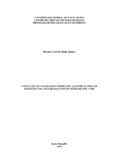| dc.creator | Dode Junior, Hermes Correa | |
| dc.date.accessioned | 2020-03-10T14:14:53Z | |
| dc.date.available | 2020-03-10T14:14:53Z | |
| dc.date.issued | 2018-03-26 | |
| dc.identifier.uri | http://repositorio.ufsm.br/handle/1/19791 | |
| dc.description.abstract | The dissertation aims at first to establish a concept of State of Exception according to the Agambem logic. Following these theoretical contributions, we try to explain why the State of Exception logic is strictly connected to the Democratic State of Law becoming so the State of Exception no more an exception but a rule, term we use as Permanent State of Exception, sense we look for unhiding the true intentions of Nation-state. Soon we bring into discussion the immigrant who will in this security conjecture be nominated as non-subjects because the power structures are shaped for their exclusion. We do the critics about the sovereignty theories that legitimate the Permanent State of Exception with the intention to restrict human mobility segregating the immigrant by policies of maintenance of the neoliberal state, like hidden universalization and the big problems in the world. We are distinct subjects, and the idea of homogenization – brought by the concept of universalization – reproduces a silent violence in the other, putting the immigrant as an enemy of the State with the security speech. In the final chapter, we do a historical survey about Brazilian constitutions of 1934 and 1964 and also their migratory legislation about migration, seen that that all those constitutions have an ethos of exception. At the end, we discuss about the constitution of 1988 and its exclusive character with respect to citizenship and nationality pointing the advances and regressions in the new Brazilian law of migration (law n°13.445/2017). Therefore, we conclude that the assumption that the right of migration should not be treated as an economical ou security policy but as a human right to migrate. | eng |
| dc.language | por | por |
| dc.publisher | Universidade Federal de Santa Maria | por |
| dc.rights | Attribution-NonCommercial-NoDerivatives 4.0 International | * |
| dc.rights.uri | http://creativecommons.org/licenses/by-nc-nd/4.0/ | * |
| dc.subject | Estado de exceção | por |
| dc.subject | Migrações | por |
| dc.subject | Cidadania e nacionalidade | por |
| dc.subject | State of exception | eng |
| dc.subject | Migration | eng |
| dc.subject | Citizenship and nationality | eng |
| dc.title | A exclusão do (não)sujeito imigrante a partir da ideia de exceção: uma análise das constituições de 1934 a 1988 | por |
| dc.title.alternative | Exception idea and the (no)subject immigrant exclusion: an analyses of the constitutions of 1934 to 1988 | eng |
| dc.type | Dissertação | por |
| dc.description.resumo | A dissertação busca, em um primeiro lugar, traçar o conceito de Estado de Exceção segundo a lógica de Agamben. Seguindo nesse aporte teórico, tentaremos explicar o porquê de a lógica de Exceção estar intimamente ligada ao Estado Democrático de Direito, tornando, assim, o Estado de Exceção não mais uma exceção e, sim, uma regra, termo que trataremos como Estado de Exceção Permanente, sentido que buscamos desocultar as verdadeiras intenções do Estado-nação. Logo, trazemos ao centro do debate aqui proposto o imigrante, o qual dentro dessa conjectura securitária e de exclusão, será denominado não sujeitos, pois as estruturas de poderes são moldadas para sua exclusão. Faremos a crítica sobre as teorias de soberania, que legitimam o Estado de Exceção Permanente, com a intenção de engessar a mobilidade humana, segregando o imigrante por meio de políticas de manutenção do estado neoliberal, como a universalização oculta e as grandes problemáticas existentes no mundo. Somos sujeitos distintos, e a ideia de homogeneização – que o conceito de universalização carrega – reproduz uma violência silenciosa no outro, estigmatizando o imigrante como inimigo do Estado, utilizando o discurso de securitização. No capítulo que encerra a dissertação, faremos um levantamento histórico das constituições brasileiras de 1934 a 1964 e a sua legislação migratória no tocante a migração, visto que todas estas constituições possuem ethos de exceção. Ao fim, trataremos da constituição de 1988 e seu caráter excludente no que diz respeito à cidadania e nacionalidade, pontuando os avanços e retrocessos existente na nova lei de de migrações brasileira (lei n°13.445/2017). Portanto, chegamos ao pressuposto que o direito à imigração não deve ser tratado como uma política econômica ou de segurança de estado, e sim como um direito humano de migrar. | por |
| dc.contributor.advisor1 | Redin, Giuliana | |
| dc.contributor.advisor1Lattes | http://lattes.cnpq.br/2298217007407061 | por |
| dc.contributor.referee1 | Pereira, Gustavo Oliveira de Lima | |
| dc.contributor.referee1Lattes | http://lattes.cnpq.br/4828796001490761 | por |
| dc.contributor.referee2 | Silva, Maria Beatriz Oliveira da | |
| dc.contributor.referee2Lattes | http://lattes.cnpq.br/9250920062835623 | por |
| dc.creator.Lattes | http://lattes.cnpq.br/5301437982177467 | por |
| dc.publisher.country | Brasil | por |
| dc.publisher.department | Direito | por |
| dc.publisher.initials | UFSM | por |
| dc.publisher.program | Programa de Pós-Graduação em Direito | por |
| dc.subject.cnpq | CNPQ::CIENCIAS SOCIAIS APLICADAS::DIREITO | por |
| dc.publisher.unidade | Centro de Ciências Sociais e Humanas | por |



